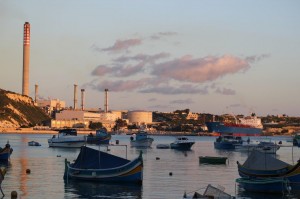by Petra Caruana Dingli
In Shakespeare’s play, Hamlet discovers that his old friends Rosencrantz and Guildenstern are carrying a letter with orders against him. He secretly changes the wording and instead they end up delivering a letter with instructions against themselves. Hamlet compares this to having “the engineer hoist with his own petard”.
This phrase is still commonly used today to refer to people falling into their own trap. 16th-century petards were small explosive devices used to breach fortifications or doorways. They were known to be unreliable, with unhappy results on the soldiers handling them.
The proposed gas-fired power station at Delimara cannot be compared to an old petard, but then this is not the 16th century and very high standards of risk analysis and safety are expected today.
Recent results of air quality monitoring have indicated that the extension to the Delimara power station, operating on heavy fuel oil since 2012, is not contributing to air pollution in Marsaxlokk and Birzebbugia after all – let alone elsewhere in Malta.
On the other hand, cars and trucks are definitely polluting the area, as they do everywhere, and measures to decrease traffic congestion would certainly help to improve air quality right away.
While switching over the power station from oil to gas is certainly good news from an environmental angle, once it has been shown that air quality in the area is within limits that are acceptable by international standards, the switch to gas is perhaps not quite as urgent as it was hyped up to be.
As the ongoing environmental impact assessment shows, many other environmental considerations besides air quality must also be factored in. In any case, the new interconnector coming online soon can provide a substantial chunk of Malta’s energy needs, releasing no air emissions at all in Marsaxlokk or the rest of Malta.
On the basis of air quality alone, it therefore seems reasonable to wait a few years until a gas pipeline is in place, for which EU funding may be available. No gas storage facility would be necessary with natural gas supplied through the pipeline, lying deep underwater on the seabed.
Besides a pipeline connecting Malta to Europe, the next best gas-supply option in terms of safety would be a gas (LNG) storage and regasifier facility out at sea, feeding Delimara with gas through a pipeline from this facility. A similar operation at Livorno is located around 20 miles offshore.
Yet for the next 18 years our government is planning to saddle the residents of Marsaxlokk and Birzebbugia with a massive gas storage tanker berthed inside the bay, instead of a facility out at sea. Due to this new power station, the use of ‘clean’ energy from the interconnector will be drastically reduced.
The captain of the gas storage vessel has requested that a breakwater is built at Marsaxlokk to protect the ship, but this is being brushed off. Maritime risk in this busy harbour is being treated like a side show. The overall risk analysis is only preliminary and still leaves many unanswered and important questions.
The gas pipeline and the offshore gas storage facility are safer options than gas storage in the middle of the bay. But they will take longer to implement than a gas tanker inside the bay, and it seems that nothing can stand in the way of the arrival of this monster vessel in Marsaxlokk next year.
And we all know why. They say it is lower electricity bills, but now that money will be raining in from the citizenship programme that reason seems a bit deflated. The reality appears to be that there are political reputations and careers in the mix. A political promise was made to switch to gas by 2015, and political deadlines are in the driving seat.
The local councils representing the interests of the residents of the area are asking for reassurance that the gas tanker might sail away in a couple of years, which sadly sounds very pie-in-the-sky. Once the gas tanker and regasifier costing mega-millions are installed in Marsaxlokk, I doubt whether they will budge in a hurry.
If one of our sociologists is seeking an opportunity to study whether residents might be better served if their local councils do not represent political parties, I suggest they might try here.
In the 1960s, the British playwright Tom Stoppard wrote a famous play inspired by the two old friends of Hamlet. In Stoppard’s interpretation, one reason why Rosencrantz and Guildenstern end up badly is because they are confused when confronted with a choice. They are torn between different loyalties, like our local councils, and are hoist with their own petard.
petracdingli@gmail.com
This article appeared in the Times of Malta 25 February 2014
http://www.timesofmalta.com/articles/view/20140225/opinion/Hamlet-goes-to-Delimara.508240



Comments are closed.